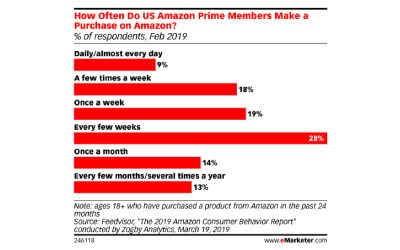Selling on Amazon vs
Your Own Website : Pros & Cons

The Pros Of Selling On Amazon
With a brand as big as Amazon, many apparent benefits come with it. But, we will focus on the advantages for online retailers that become the reasons behind opting to sell on Amazon on initial level:
Ready To Exploit Market
Whenever someone thinks of opening a business, building a steady pipeline of customers is the biggest challenge. This effectively translates into building a strong online brand presence, but that requires a lot of time and money. If you decide to sell on Amazon, you can access a large customer pool, thanks to its brand value. Also, Amazon helps you run remarketing ads, helping you make the most out of it.
Lower Entry Barrier
You don’t need to have deep pockets to begin selling on Amazon, and the cost is generally below $4000 . Also, you don’t need to spend money to generate traffic. Amazon is responsible for cybersecurity, and it provides infrastructure-based facilities like Amazon FBA for logistics, making it easy for you to enter online selling.
Most Of Your Operations Are Taken Care Of Amazon
You don’t need to reinvent the wheel when it comes to eCommerce operations, as Amazon has years of experience in doing so. Moreover, logistics and warehousing are provided by Amazon, thus reducing a significant amount of work apart from bringing in the customers.
The Cons Of Selling On Amazon
Selling on Amazon isn’t all sunshine and rainbows. In this portion, we have a look at the things to keep in mind while thinking of selling on Amazon:
( Image Credits )
Competition
When your product starts doing well, you will eventually find that other retailers will start selling similar items. This ultimately dents your margins. On the other hand, even Amazon starts selling highly successful products under its own brand, ‘Amazon Basics.’ Moreover, the users will see ‘similar products’ hovering around yours, which would again increase the competition you face.
Your Business Interests Are Compromised
Amazon always keeps its business interests above yours. For instance, it shifts your products between their multiple warehouses, and they are deemed ‘unavailable for sale’ during the transit. Also, your payments are released every 14 days where your payments can be held back partially. You won’t be able to capture customer information, thus leaving no room for repeat business if you don’t have a strong brand. Since you are charged a certain portion of your sales, the costs will increase with your revenue and exceed costs incurred by independent ecommerce websites.
The Pros Of Selling On Your Own eCommerce Store
Having your own eCommerce website comes with its fair share of advantages. From a business perspective, you can benefit from:
Flexibility
With your own eCommerce store, you have complete control over its design, site navigation, and products displayed. You can run promotional offers , upsell, and cross-sell as it suits your business strategy. If you’re using a platform like Shopify or Magento, an iPaaS solution to run your operations seamlessly without compromising on flexibility.
( Image Credits )
You Can Acquire And Own Customer Data
One of the biggest benefits of using an owned web store is acquiring and owning customer data exclusively. You can track user activity, the time they spend on product pages, categories generating maximum traffic, stages where customers leave during checkout, and customize your web store accordingly. These insights also help design better marketing campaigns and apply time-tested tactics like email marketing, which bring in an ROI of 4400%, considered bread and butter by eCommerce marketers.
( Image Credits )
The Cons Of Selling On Your Own eCommerce Store
The not so bright side of selling on your own website include:
High Initial Costs
Right from designing and developing your eCommerce store to managing order fulfillment and logistics require you to invest a decent amount of money upfront. Marketing also acts as a major cost center, putting enormous pressure on new stores.
You Are Responsible For Everything
You will need to look after processes like lead generation, conversion, payment processing, inventory management , warehousing , shipping , returns processing, marketing , procurement, and order processing , to name a few. This can be extremely challenging for brewing businesses that lack experience and budget.
Get The Best Of Both Worlds: Sell On Both Amazon And Your Own Website
As we can see, both Amazon and your website come with mutually opposite sets of benefits and limitations. For a new store, selling on Amazon is both favorable and cheaper, but as they scale up, having their own eCommerce store helps them with adequate control at lower costs. Also, if you have a compelling brand identity, a lot of Amazon users will try to search your products over there and go to your competitors if they don’t find you. With a dedicated solution like the eCommerce growth engine from i95Dev , you can sell products on your own site and Amazon to get the best of both worlds.
Summing Up
Perhaps, it is advisable to sell on both your own website and Amazon as it nullifies their individual shortcomings. This is especially true for the post-pandemic reboot . Want to talk with experts? Book a free consultation call with i95Dev to get the best insights and technical solutions for selling on Amazon along with your own eCommerce website.
Recent Blogs
Streamlining eCommerce Business with Adobe Commerce (Magento) and NetSuite Integration
Streamlining eCommerce Business with Adobe Commerce (Magento) and NetSuite Integration Author Category Share In the ever-evolving world of commerce, managing eCommerce operations can feel...
B2B e-commerce – How Home Depot is leading the game
B2B eCommerce – How Home Depot is leading the game Author Category Share The home improvement industry has undergone a remarkable transformation, and at the heart of this change is the rise...
Accelerating Success: Best Practices for Automotive eCommerce
Accelerating Success: Best Practices for Automotive eCommerce Author Category Share In recent years, eCommerce has revolutionized the automotive sector, driving a notable surge in sales and...







